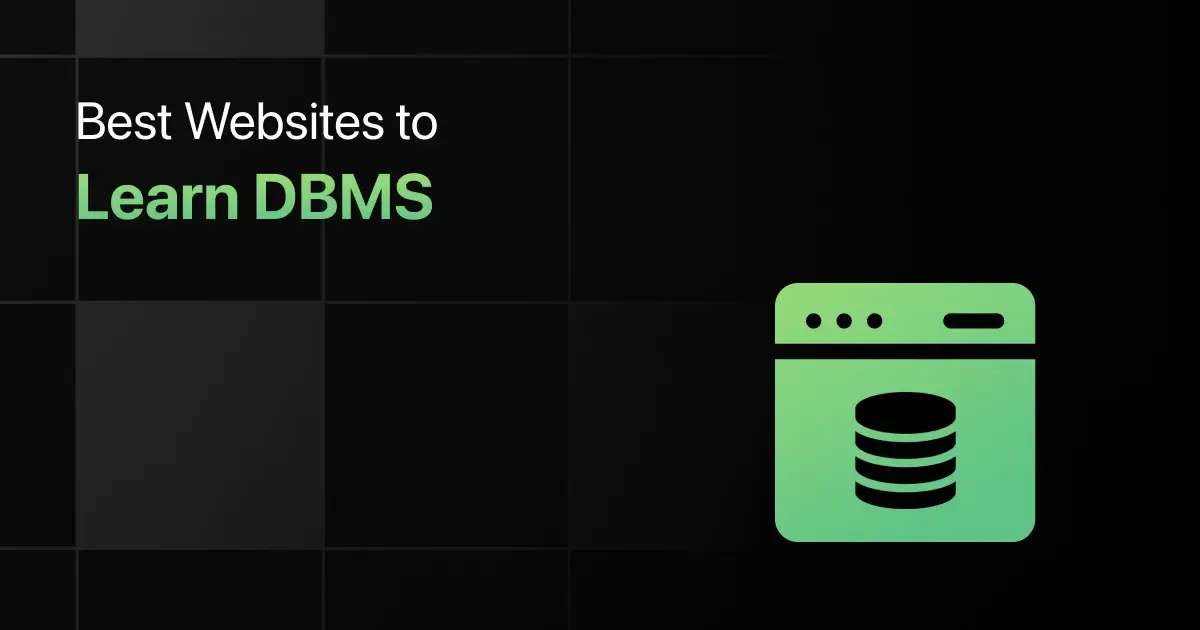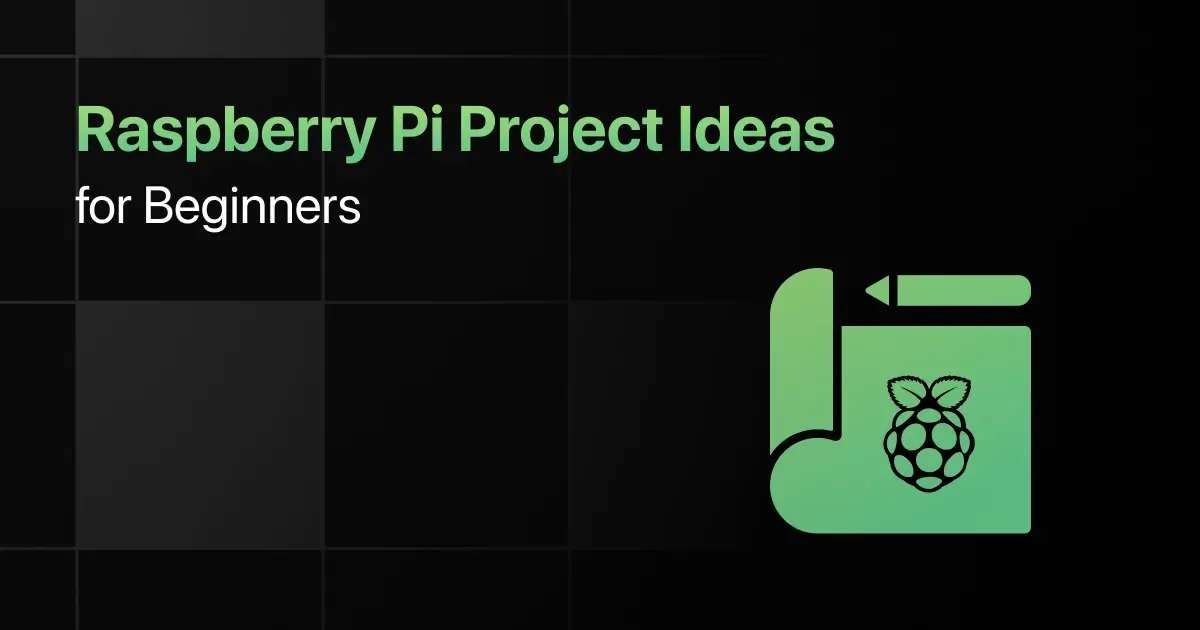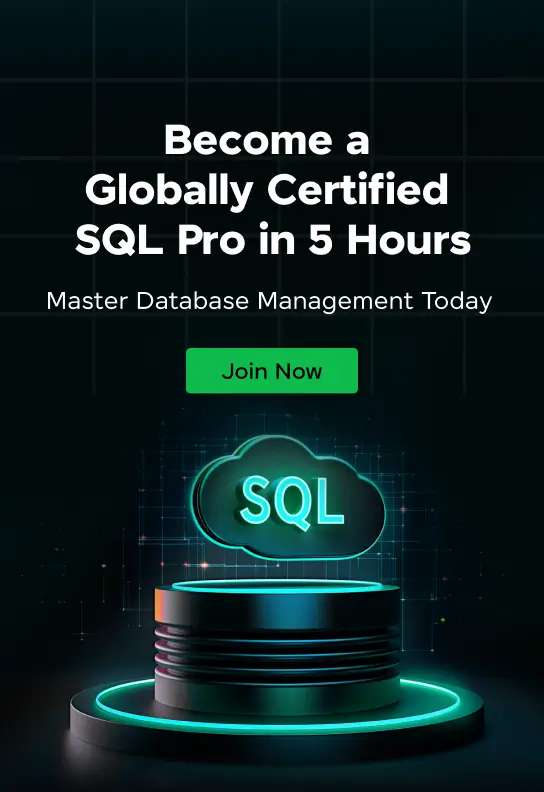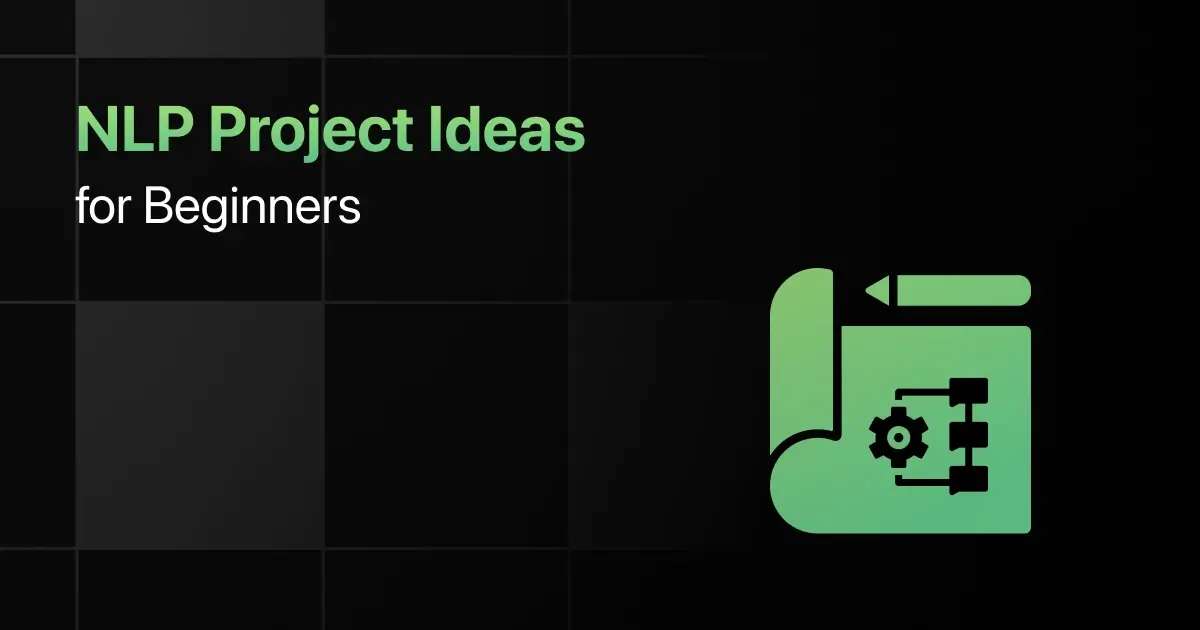Best Websites to Learn DBMS

Curious about how databases work and want to learn DBMS (Database Management Systems) without spending any money?
Check out the best websites to learn DBMS for free, where you can gain essential database management skills and knowledge without any cost.
10 Best Websites for DBMS – Overview
Here’s an overview of the top 10 websites to learn Database Management Systems:
| S.No. | Website Name | Course Duration | Pricing | Certification | Website Link |
|---|---|---|---|---|---|
| 1 | GUVI | 4 hours | Paid | Yes | Visit Now |
| 2 | Coursera | 122 hours | Freemium | Yes | Visit Now |
| 3 | edX | 5 months | Freemium | Yes | Visit Now |
| 4 | freeCodeCamp | 4 hours | Free | No | Visit Now |
| 5 | Tutorialspoint | Self-paced | Free | No | Visit Now |
| 6 | Udemy | Self-paced | Paid | Yes | Visit Now |
| 7 | Vertabelo Academy | 10 hours | Paid | Yes | Visit Now |
| 8 | Khan Academy | Self-paced | Free | No | Visit Now |
| 9 | Oracle Database Learning Resources | Self-paced | Free | Yes | Visit Now |
| 10 | W3Schools | Self-paced | Free | No | Visit Now |
Best Websites to Learn DBMS for Beginners
Below is the list of best websites to learn DBMS for beginners:
1. GUVI
GUVI’s MySQL course is designed for learners to become proficient in managing the MySQL database, one of the most utilized databases in the tech world.
The course is structured into beginner, intermediate, advanced, and expert modules, catering to learners with varying levels of expertise in MySQL.
Course Diversity: he course covers topics like DBMS & RDBMS, DDL, DML, DCL and TCL, creating databases and tables, insert and select queries, order by and group by clauses, joins, string and date operations, auto increment, triggers, index views, and using commit & rollback.
Pricing: INR 999
Certifications: Certificate issued by GUVI, an IIT-M incubated company.
Language Options: English.
Course Duration: It includes 4 hours of recorded content.
2. Coursera
The “Database Management Essentials” course, offered by the University of Colorado System on Coursera, is designed to provide foundational knowledge for a career in database development, data warehousing, or business intelligence.
Course Diversity: This course includes topics such as database design, ER model, DBMS, SQL, and various aspects of querying and schema design. It covers creating relational databases, writing SQL statements, designing entity relationship diagrams (ERDs), and analyzing table designs. The course uses Oracle, MySQL, or PostgreSQL for executing SQL statements.
Pricing: The course can be audited for free. There is also an option for a paid upgrade that includes additional benefits, like a shareable certificate.
Certifications: Shareable certificate upon completion, which can be added to LinkedIn profiles or resumes.
Language Options: English with content available in 22 different languages.
Course Duration: It is estimated to take approximately 122 hours to complete.
3. edX
The Database Management Systems MicroMasters® Program, offered by the University of Maryland Baltimore County (UMBC) on edX, is designed to provide comprehensive training in database management.
The program focuses on skills needed for database administrators working with both relational and NoSQL databases.
Course Diversity: The program comprises three graduate-level courses: “Relational Database Management Systems,” “Relational Database Design,” and “NoSQL Databases.” It covers designing models of databases, creating relational and NoSQL databases, and gaining experience with multiple database technologies. Topics covered include creating databases, interacting with data within databases, and experiencing multiple database technologies.
Pricing: Full program is $672.30, with the pre-discounted price being $747 USD.
Certifications: MicroMasters® Program Certificate from UMBC and USMx.
Language Options: English.
Course Duration: The program is self-paced, with an estimated duration of 5 months, requiring 8-10 hours of study per week.
4. freeCodeCamp
This freeCodeCamp course, taught by Mike Dane, is an introductory course on database management basics and SQL. It begins with guiding learners on how to install MySQL on Windows or Mac and covers fundamental topics like schema design, CRUD (Create-Read-Update-Delete) operations, and other key database concepts.
Course Diversity: The course covers a range of topics including database fundamentals, tables and keys, SQL basics, creating tables, inserting data, database constraints, basic queries, functions, wildcards, unions, joins, nested queries, triggers, and ER diagrams.
Pricing: Free
Certifications: Nil
Language Options: English.
Course Duration: The entire course is a 4-hour long video, available on YouTube with no ads.
5. Tutorialspoint
The Database Management System (DBMS) tutorial on TutorialsPoint provides an extensive understanding of DBMS technology. It covers the technology of storing and retrieving users’ data efficiently, ensuring appropriate security measures.
Course Diversity: This tutorial offers an in-depth look into various aspects of DBMS, including real-world entity relationship models, relational data models, database normalization, database joins, indexing, hashing, transaction and concurrency control, and backup and recovery methods.
Key topics include DBMS architecture, data models, data schemas, data independence, E-R model, relational model, relational database design, and storage and file structure.
Pricing: Free
Certifications: Nil
Language Options: English.
Course Duration: Self-paced online tutorial
6. Udemy
“The Complete SQL Bootcamp: Go from Zero to Hero” on Udemy, created by Jose Portilla, is designed to turn beginners into SQL experts. The course provides in-depth training in PostgreSQL and covers a broad range of SQL concepts and applications.
Course Diversity: The course includes comprehensive training in various SQL aspects such as query formulation, data analysis, working with GROUP BY statements, creating company databases, and more. It also addresses advanced SQL topics and practical applications.
Key topics include PostgreSQL and PgAdmin installation, SQL syntax, aggregate functions, string operations, logical operators, JOIN commands, table and database creation, and using Python to enhance SQL skills.
Pricing: INR 449
Certifications: Certificate of completion from Udemy.
Language Options: English, with auto-generated subtitles in English and Arabic, among other languages.
Course Duration: Self-paced
7. Vertabelo Academy
The SQL Basics course on Vertabelo Academy is designed for those looking to get started in SQL and learn the fundamentals of querying a database. It’s an interactive course that helps learners build basic reports and retrieve data from databases.
The course starts with simple queries on a single table and progressively covers more complex topics, such as working with multiple tables, using different JOIN methods, and creating reports using GROUP BY functions.
Course Diversity: Key topics include database fundamentals, data retrieval, building basic reports, complex WHERE conditions, working with operators like LIKE, ILIKE, IN, and BETWEEN, multiple table operations, various JOIN types, report creation with aggregate functions, subqueries, and understanding SQL set operations.
Pricing: $29 after a 25% discount, with the original price being $39.
Certifications: Certificate of completion in PDF format.
Language Options: English.
Course Duration: 10 hours, with a total of 129 interactive exercises.
8. Khan Academy
The “Intro to SQL: Querying and Managing Data” course on Khan Academy is designed to teach the basics of SQL for storing, querying, and manipulating data. This course is suitable for beginners and covers the use of SQL in relational databases, a skill widely used by numerous apps and organizations.
Course Diversity: The course explores a range of SQL skills, including simple to complex queries, using AND/OR, IN, LIKE, HAVING, CASE statements, inner and outer joins, self-joins, query planning, and optimization. It also covers updating, deleting data, and changing table schemas with SQL commands.
Topics include creating tables, inserting data, querying tables, data aggregation, advanced SQL queries, relational queries, and modifying databases with SQL.
Pricing: Free
Certifications: Nil
Language Options: English.
Course Duration: Self-paced
9. Oracle Database Learning Resources
“Databases for Developers: Foundations” is a free SQL course offered by Oracle Dev Gym, designed to introduce learners to Oracle Database and SQL. This course includes a series of videos, interactive SQL tutorials, and quizzes to teach database concepts and practical SQL skills.
It covers topics such as creating databases, interacting with data, schema design, data types, data modeling, and various SQL functions and operations like inserts, updates, deletes, joins, and aggregates.
Course Diversity: The course includes modules on tables, columns and data types, data modeling, SQL queries (SELECT, JOINs, GROUP BY), inserting and committing data, updating and handling transactions, deleting and truncating data, and more.
Pricing: Free.
Certifications: Certificate of achievement from Oracle Dev Gym.
Language Options: English.
Course Duration: Self-paced.
10. W3Schools
The MySQL RDBMS tutorial on W3Schools offers an informative guide to understanding Relational Database Management Systems (RDBMS) using MySQL. This tutorial focuses on explaining the key concepts of RDBMS, including its structure, the importance of tables, columns, rows, and relationships between tables.
It provides practical insights into how relational databases define relationships in the form of tables and the utilization of SQL queries for data manipulation.
Course Diversity: The tutorial covers foundational aspects of MySQL RDBMS, including database table structure, relational database concepts, and illustrates this with examples from the Northwind database, highlighting relationships between different tables like ‘Customers’, ‘Orders’, and ‘Shippers’.
Pricing: Free
Certifications: With an additional fee and exam.
Language Options: English.
Course Duration: Self-paced
Frequently Asked Questions
1. What are the best websites for learning DBMS?
The best websites for learning DBMS are:
- GUVI
- Coursera
- edX
- freeCodeCamp
- Oracle Database Learning
2. What are some free DBMS learning websites along with certifications?
GUVI, freeCodeCamp, Tutorialspoint, Khan Academy, Oracle Database Learning, W3Schools are some free DBMS learning websites along with certifications.
3. Why should I choose a website for learning DBMS?
You should choose a website for learning DBMS because they offer flexibility and have a variety of learning resources. They cater to different learning styles with interactive tutorials, video lectures, and hands-on exercises.
4. How do I choose the right website for learning DBMS?
You can choose the right website for learning DBMS by considering factors like course content quality, learning style compatibility (videos, interactive exercises), instructor expertise, community support, and pricing.
5. Can a beginner learn DBMS effectively through websites?
Yes, beginners can effectively learn DBMS through websites. Many platforms offer beginner-friendly courses that start with basics and gradually progress to more complex topics.
6. Are there websites that offer content in multiple languages for learning DBMS?
Yes, some websites like Coursera and Udemy provide DBMS learning content in multiple languages and subtitles.
Final Words
These websites are like your personal database workshops, offering a variety of lessons and practical exercises in DBMS.
Keep checking this article as we will keep updating this space as more websites make space in the heart and study schedule of students preparing for placements and competitive exams.
Explore More DBMS Resources
Explore More Websites
- Python
- Java
- Coding
- C++
- C Programming
- SQL
- JavaScript
- Data Science
- HTML & CSS
- Web Development
- Data Structures and Algorithms
- AI & Machine Learning
- Ethical Hacking
- Android Development
- React JS
- Game Development
- Competitive Programming
- Digital Marketing
- Tableau
- R Programming
- PHP
- Cyber Security
- Excel
- Node JS
- Data Analytics
- Bootstrap
- Cloud Computing
- Operating System
- Angular
- RPA
Related Posts


How to learn machine learning
Are you interested TESTING in practically mastering Data Analytics? Then you are in the right place. Data Analytics is the process …









